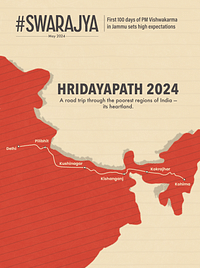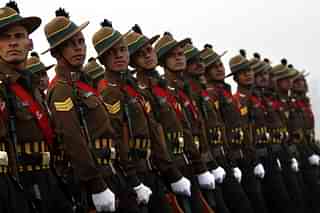Ideas
Selective Outrage: Israel-Palestine Conflict Throws Light On Inconsistencies In Activism For Justice At Home
Aditya Saraff
Oct 30, 2023, 03:01 PM | Updated 03:14 PM IST
Save & read from anywhere!
Bookmark stories for easy access on any device or the Swarajya app.
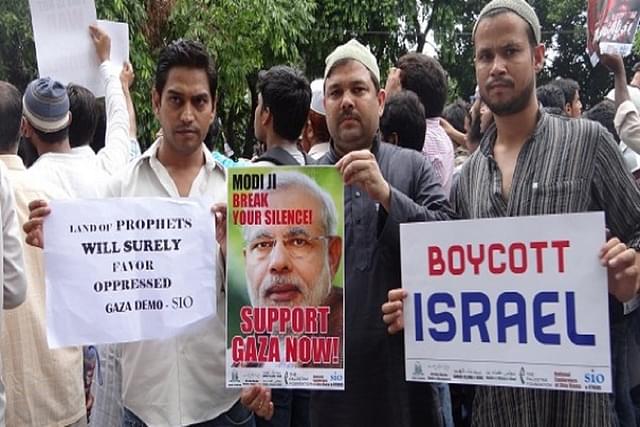
While there are genuine concerns over the humanitarian conditions in Gaza, it is an unmistakable fact that not all support for Palestine stems from this concern.
Rather than take sides in the ongoing war, this writer aims to highlight the double standards that have been applied over viewing the blazing war between Israel and Palestine and the countless issues encountered and fought over decades by Hindus in India.
There has been an overwhelming swarm of tweets that not only support Palestine, but go so far as to say Israel has no right to exist, having been built, as they claim, upon the depredations of the holy Palestinian lands.
Many of these tweets come even from Indian supporters of Palestine.
The issue, however, lies where historical amnesia and selectivity of justice combine, when fighting for justice.
Indian Hindus have witnessed thousands of years of encroachment. The mosques on the Mathura and Kashi lands (Shahi Idgah and Gyanvapi mosques) and previously the Ayodhya mosque — were built over the depredations of Hindu temples of worship.
Estimates show that over 42,000 mosques have been built over the remains of temples. There is rank duplicity when it comes to raising voices for freeing of these lands.
There are those who are raising their voice over a 'genocide' in Gaza, claiming that a hostile takeover is under progress, that will lead to the wiping out of an entire population.
Justice for Kashmiri Hindu pandits, on the other hand, remains elusive — even a discussion of it.
The case for the exodus or death of more than one lakh Kashmiri Hindus, out of an estimated population of 1.2 lakh, who have now become refugees in their own land, fall on deaf ears. Only if they had sway over social media, too.
Those subjected to the worst of violence — wiping out of entire neighbourhoods and generations, and whose property was taken over — still wait for justice.
Their cases, though, are deemed too old now for justice. To quote Dr Anand Ranganathan from his book Hindus in Hindu Rashtra:
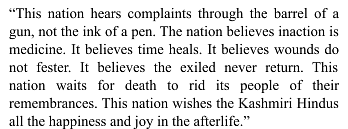
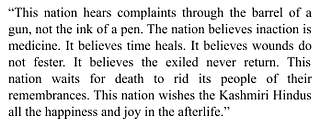
Similarly, there is unhappiness and anger about Western democracies taking the side of Israel over Palestine. There are demands made of the Indian side, of its government, to take sides, even though India has always propagated a two-state solution and formally accepted the Palestine Liberation Organisation (PLO) as a legitimate authority.
However, when matters discussed earlier, like justice for Kashmiri pandits, is brought up at home, all support for aid for these victims vanish and so does all the will to bring forth justice and the voice against government inaction.
Those in India on the side of Israel are no innocent, too, when it comes to selectivity. Many videos have been shared from universities in the Gaza region where radicalised children can be seen shouting slurs for Jews and believe that it is their god-given duty to exterminate them.
Supporters of Israel can be seen sharing their opinions on how educational institutions in Palestine are indoctrinating students and how harmful this will turn out to be for the future stability and peace of the country.
Hindu religious educational institutions have seen sophisticated and systematic persecution. Grants for these institutions have been delayed, promised scholarships delayed, and funding stopped, until most of these institutions succumbed to financial pressure.
However, religious institutions, such as madrassas, have continued to prosper with massive state funding. Such institutions — have in the past and continue to — indoctrinate students with unsustainable ideas relating to monotheism and intolerance of other cultures.
Videos, like those of compulsory offering of namaz by all students, irrespective of their religion, at some institutions, before education is imparted, or those of young madrassa-going children being made to chop off the head of a cow-shaped cake, can easily be found.
Yet, you would find little to no voice being raised about this issue.
On the other hand, when news related to not persecution but auditing of madrassas’ funds in Uttar Pradesh or that about conversion of madrassas into educational institutes is published, one can see chaos ensue and condemnations pour out.
In countries like Canada and the US, we have seen mass protests, with students coming out in support of Palestine. However, what is also as common is photos of those unwilling to participate being labelled anti-Muslim.
There has been outrage about slogans such as “From the river to the sea, Palestine will be free” used by students. When it comes to slogans such as ‘Humen tumse kya naata…’ or 'Tum kitne Afzal maaroge, har ghar se Afzal nikalega’ glorifying terrorists such as Afzal Guru, there is deafening silence from the proponents of justice, especially on the left.
Everyone is expected to measure up words while speaking so as not to be misunderstood and subsequently stratified — support Israel too much and one may be deemed an anti-Muslim; support Palestine too much and you may just be called a terrorist sympathiser.
What remains constant through this heckling, is that those calling others terrorist sympathiser or a person with Islamophobic tendencies, will be among the first to maintain silence on matters of anti-Hindu thought.
In a similar spirit, one can see how the recent calls for genocide of about 80 per cent of a country’s population, made by Udayanidhi Stalin, calling for the eradication of everyone under the fold of the Sanatana Dharma, will be tolerated, but the quoting of Islamic scripture Sahih al-Bukhari 5134 and the Sunan an-Nasa’I 3378 by Nupur Sharma will be called out every time.
Until the majority believes they are majoritarian, they will be told again and again about the Sabarimala Temple entry system, the rituals of the Dharmapuram Adheenam Pattina Pravesam, and the ‘inhumane’ Jalikattu practices or the dangers of Makar Sankranti and Diwali celebrations.
However, silence will be maintained over similar practices in Sedia Gestatoria, Moharram, Christmas, and New Year celebrations.
Aurangzeb, who killed millions of Hindus, is glorified again and again while Hamas is called a terror outfit.
We have seen every media outlet, and USCIRF, cover the burning of the mosque and the killing of the Imam — both tragic events that must be investigated, but how many times have we heard about Abhishek, 22 and the breadwinner of a family of six, who was shot through with bullets trying to protect pregnant women and whose head was chopped off his body, as he lay on the street dying?
Or the case of stones being pelted at a Vishwa Hindu Parishad rally and their cars being burnt? In fact, this country has normalised stone pelting when it comes to celebrating Ram Navami and Ganesh Chaturthi, the recent events in Surat only adding to the mix. There is a recurring theme to this.
Equal treatment is demanded abroad but Uniform Civil Code at home is not supported; property rights and the right to exist are demanded for those suffering abroad, but there is a hush when it comes to protesting against Waqf.
While everyone wants to talk about the war, no one wants to talk about the slaughter of protesters outside the parliament in 1966.
When the protesters demand that the Indian state should lend an accepting hand towards Palestinian masses, they forget that they are the ones who protested the citizenship laws that would grant citizenship to persecuted minorities from neighbouring states!
It is as if, someone wanting for not all to be equals, is demanding equality.
Finally, this has not been an attempt at whataboutery or to connect two irrelated things: a reader fighting for justice for victims of injustice abroad should be able to correlate these facts well.
Rather, it has been an attempt to put history into perspective and implore the reader to reflect on whether justice at home is not as important, if not more, as justice outside, and that while voices are raised in support of foreign populations, the same treatment should be afforded to victims at home too.
Save & read from anywhere!
Bookmark stories for easy access on any device or the Swarajya app.
Aditya Saraff is a student of commerce, pursuing his Bachelor’s degree and CA in Mumbai. In addition to being an avid reader, he is very passionate about history, law, and politics. At his alma mater, The Doon School, Saraff wrote actively for various school publications.
Support Swarajya's 50 Ground Reports Project & Sponsor A Story
Every general election Swarajya does a 50 ground reports project.
Aimed only at serious readers and those who appreciate the nuances of political undercurrents, the project provides a sense of India's electoral landscape. As you know, these reports are produced after considerable investment of travel, time and effort on the ground.
This time too we've kicked off the project in style and have covered over 30 constituencies already. If you're someone who appreciates such work and have enjoyed our coverage please consider sponsoring a ground report for just Rs 2999 to Rs 19,999 - it goes a long way in helping us produce more quality reportage.
You can also back this project by becoming a subscriber for as little as Rs 999 - so do click on this links and choose a plan that suits you and back us.
Click below to contribute.
